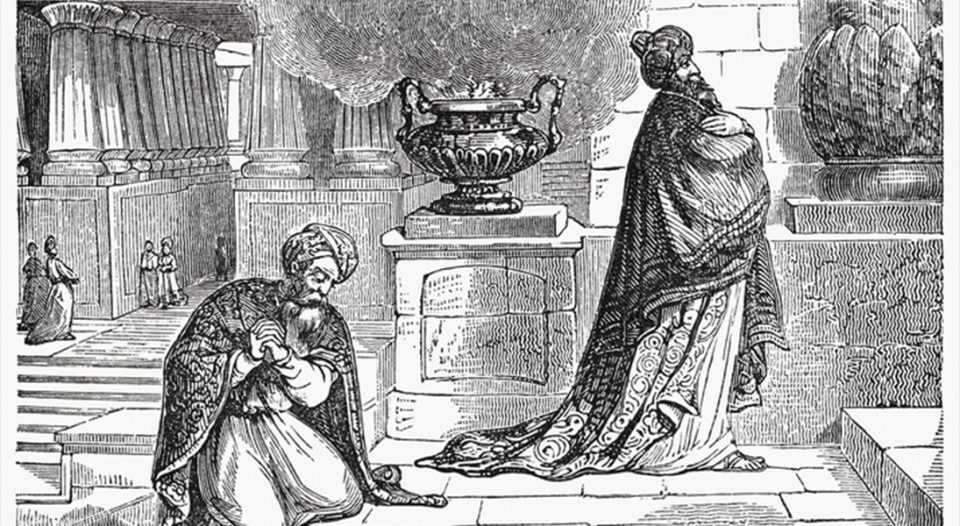Lectionary blog for Oct. 26, 2025
20th Sunday after Pentecost
Jeremiah 14:7-10, 19-22; Psalm 84:1-7;
2 Timothy 4:6-8, 16-18; Luke 18:9-14
Have you ever been shocked and dismayed by what other Christians believe is good, noble or worth defending? I have. As I get older, I find that I have less energy for fighting in any kind of culture wars. Also, as a Lutheran Christian and a theologian of the cross, I am responsible “to call a thing what it is,” and have a public witness of the fullness of the gospel. This has been a tough last several years for watching North American Christianity lose the plot, and I have been at times awash with sadness, and even sometimes contempt, seeing people attempt to turn Jesus into their chosen side’s mascot. And that sadness and contempt I feel is the subject of the lectionary reading for this week.
Jesus told a parable about folks who trusted that they were righteous and viewed others with contempt. There was a Pharisee who went to pray. He thanked God that he had been allowed and empowered to live a righteous life. He did not cheat people. He was fair and honest. He did not have problematic sex. He did not collaborate with the forces of empire that occupied and defiled the people close to God’s own heart. He did not pursue his own appetites and made sure that he gave a just portion of everything he owned to the poor and the needy (Luke 18:11-12).
But there was another man who also went to pray. All Jesus says about his daily life and manner of living is that this man did collaborate with the forces of empire. He took resources from the occupied people and gave them to those who traveled from Europe to oppress and kill thousands and thousands of Jews, including Jesus himself (Luke 18:13). When this man prayed, he stayed far off, he did not lift his head, struck himself, and simply pleaded for God to be merciful to him, a sinner. Jesus said that it was the second man, not the first, who went away justified.
Jesus’ reasoning is what we have been discussing for many weeks now in the time after Pentecost: the exalted will be humbled, and the humble will be exalted. That is the exact, and only, way that God’s kingdom works. If I make a career and some notoriety by punching down, by having contempt on people whose contexts and experiences have led them to think differently about a subject than I do, I am exactly like Jesus’ hypothetical Pharisee. Contempt and disdain are poison to a righteous life. Remember, it was not for any lack of righteous actions that the Pharisee was not the hero of this parable. Instead, the problem was looking down on the abjectly penitent man who recognized the profound wickedness of his involvement in a death-dealing system.
The exalted will be humbled, and the humble will be exalted. That is the exact, and only, way that God’s kingdom works.
So, then, how shall we live? What we absolutely must not do is to slide into some sort of “nothing matters but confession and salvation,” dead -husk version of Christianity. One would have to discard the Bible, and all the teachings of the church, including the reformers, to arrive at that erroneous end. What we do matters and has eternal impact.
Jesus insists that the righteousness of his followers must exceed that of the righteous Pharisees (Matthew 5:20). The early church was known for their righteous care for the poor and utter rejection of violence. Jesus himself charged his followers to give food and water to those in need, care for the sick, visit those in prison, welcome foreigners and clothe those without resources (Matthew 25:31-46). Good and evil exist in the world, and Jesus’ followers are to live their lives by adding to the “good” column and subtracting from the “evil” column, as we pray that God’s kingdom come on earth, as it is in heaven.
But while we are doing that, we do not, even for a second, get to indulge in a sense of pride or superiority. “Thank God I’m not like those other Christians, whose theology is terrible, whose worship is drivel, whose social policies are injurious rather than Christlike!” The truth of the matter is that terrible theology exists. Empty, vain worship exists. We know that people have been death-dealing in the name of Jesus for a couple thousand years. The way to combat these things, however, is not through pride but humility. Where are we falling short? How can we serve better? How have we substituted our preferences for God’s? What do we need to be confronted with to live in greater alignment with God’s kingdom?
Don’t get this parable twisted: The Pharisee did all the right things. The tax collector didn’t. The solution is not to live an evil life and be sad about it. Instead, Jesus is calling us to love God and care for neighbor, and to be humble while doing it.






